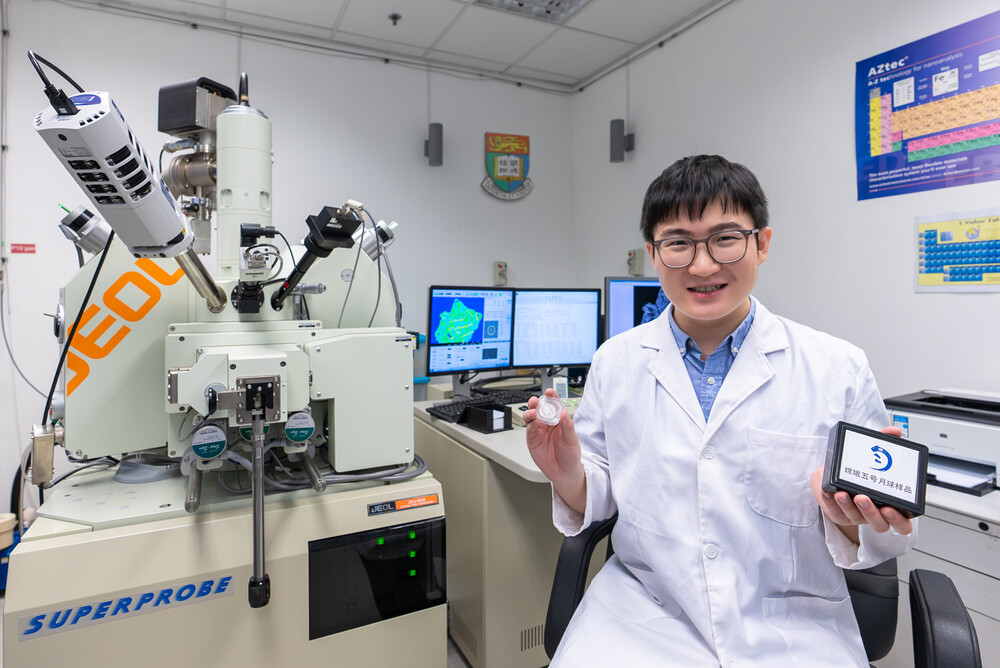
Dr Yuqi QIAN
Department of Earth Sciences, and Laboratory for Space Research
‘As a budding planetary geologist, I feel fortunate to be entering my career at a time when the world is rapidly advancing its efforts to colonise the Moon.’
Dr Yuqi QIAN, Postdoctoral Fellow at the Department of Earth Sciences and the Laboratory for Space Research
Research foci: Planetary Volcanism, Planetary Geology, Planetary Chemistry, China’s Lunar and Planetary Exploration
Research foci: Planetary Volcanism, Planetary Geology, Planetary Chemistry, China’s Lunar and Planetary Exploration
As a child, Dr Yuqi QIAN, Postdoctoral Fellow at the Department of Earth Sciences, would gaze up at the night sky in awe, captivated by its vastness and the mysteries it held. Simultaneously, he would marvel at the Earth and its formation, wondering what secrets lay beyond our world. This sense of wonder never left him, and as he grew older, his passion for unravelling the mysteries of the universe only grew stronger. With the guidance of his supervisor Professor Joseph MICHALSKI, Yuqi formed a team in 2022 and competed for lunar soil samples collected by the Chinese lunar probe Chang'e-5 in 2020. After a rigorous selection process, in June 2023, Yuqi and his team received approval from the China National Space Administration's Lunar Exploration and Space Engineering Centre to study the lunar soil samples, which collectively weigh 822.6 milligrammes. This remarkable achievement marks the first time a research team from Hong Kong has obtained such valuable lunar samples, which hold immense value in unravelling the geological and thermal history of the Moon, as well as its connection to the formation and evolution of other celestial bodies within the Solar System.
Growing up in a small town in northern Zhejiang Province, Yuqi was fascinated by nature and space, nurturing his passion for exploration. His insatiable curiosity led him to delve into books on the origins of life and science fiction, igniting his imagination about humanity's future and our planet. These experiences inspired his deep-seated desire to study geology, a field that explores the origins and destiny of Earth and life itself.
During his undergraduate studies, Yuqi focused on studying volcanism on Earth. It was during this time that lunar and planetary science in China began to flourish, driven by the expanding Chinese lunar programme. Recognising the immense opportunities for lunar research both in China and globally, he firmly believed that these developments would pave the way for scientific and technological breakthroughs that would ultimately benefit all of humanity.


Thermal infrared photo of Yuqi in 2017, when he was a senior undergraduate student, taken at a seminar of Mars thermal infrared remote sensing.
Yuqi's research has caught the media's eye, and he frequeuntly
shares his expertise through interviews.
‘The Moon, our closest celestial neighbour, is the best-understood planetary body aside from Earth. It is hypothesised to have formed from a massive collision between proto-Earth and a Mars-sized planet, Theia. Therefore, studying the Moon's geology holds secrets about our own planet,’ Yuqi explained, expressing his eagerness to contribute to this grand expedition.
Before completing his doctoral degree in planetary geology and comparative planetology, Yuqi achieved a breakthrough by examining impact melt beads from Chang'e-5 soil samples. He collaborated with his teammates and discovered that their ages indicate an increase in impact flux within the Earth- Moon system around 600 million years ago, which may have contributed to the extinction of the dinosaurs. This finding further fuelled Yuqi's determination to contribute to the exploration of space and unravel the mysteries of our cosmic neighbourhood.
‘The 21st century is truly the century of space exploration. I am eager to contribute to humanity's journey, beginning with the Moon, then Mars, and beyond. I eagerly anticipate the first human return to the Moon in the next decade and the establishment of lunar bases by 2035, with significant contributions from China. If we can conquer the challenges of surviving on the Moon, why not extend our reach to explore the vast depths of space?’
Supervisor: Professor Joseph MICHALSKI Professor of the Department of Earth Sciences and Deputy Director of the Laboratory for Space Research |
| < Previous | Next > |


